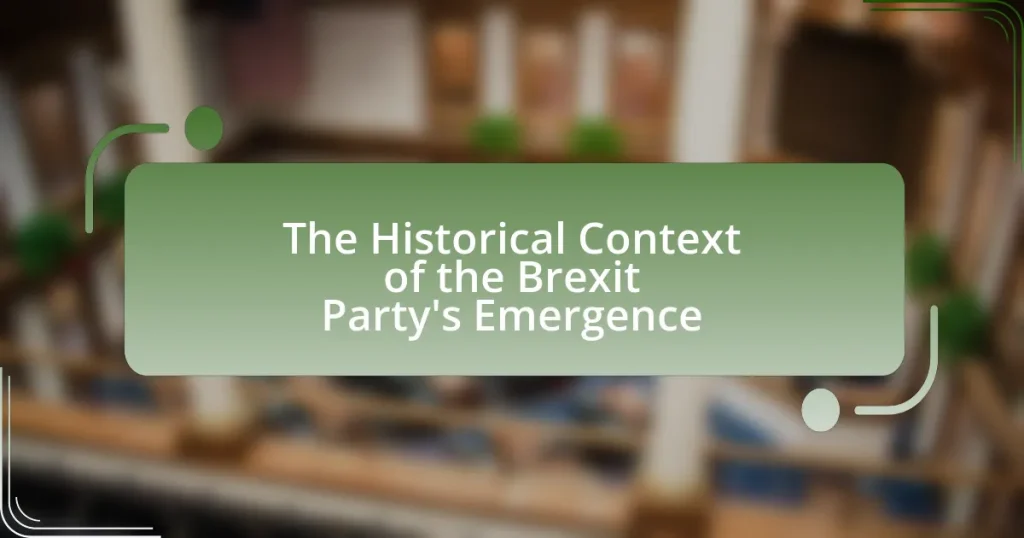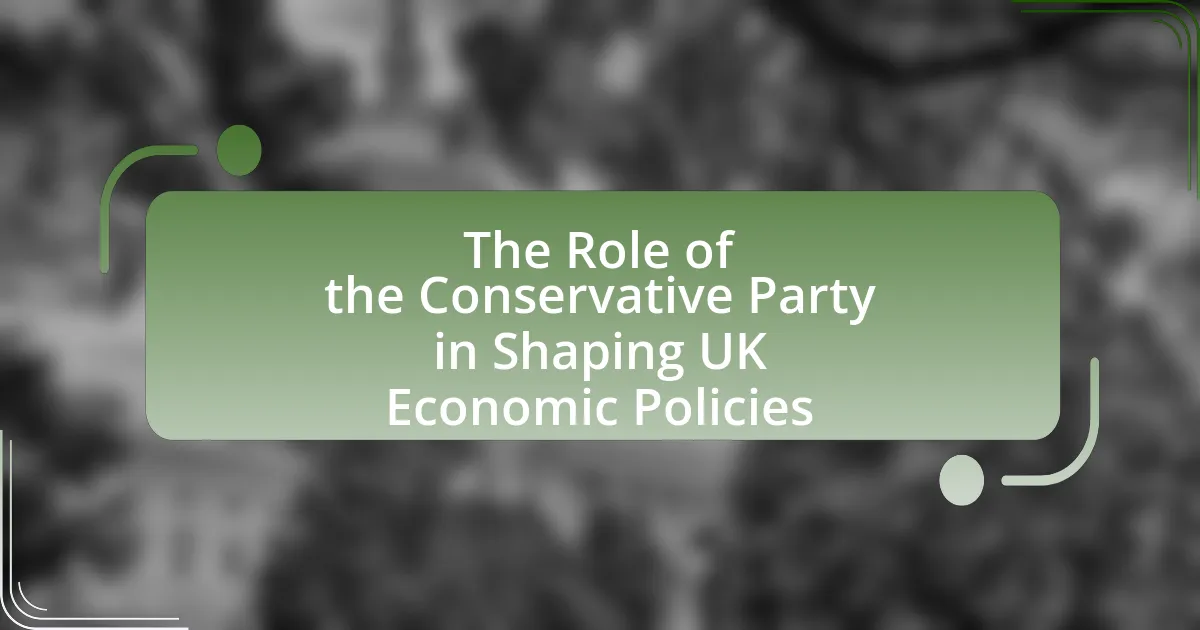The Brexit Party emerged in January 2019, founded by Nigel Farage in response to widespread public discontent with the European Union and dissatisfaction with the UK political establishment, particularly following the 2016 EU referendum where a majority voted to leave the EU. This article examines the historical context surrounding the party’s formation, highlighting key events such as the referendum, the rise of Euroscepticism, and the influence of previous political movements like UKIP. It also explores how socio-economic factors, shifting public sentiment towards immigration, and effective media strategies contributed to the Brexit Party’s rapid rise in British politics, culminating in its significant success during the 2019 European Parliament elections.
What is the Historical Context of the Brexit Party’s Emergence?
The Brexit Party emerged in the context of growing public discontent with the European Union and dissatisfaction with the political establishment in the United Kingdom. This discontent was significantly fueled by the 2016 EU referendum, where 51.9% of voters chose to leave the EU, reflecting a strong desire for sovereignty and control over immigration and trade policies. The party was founded in January 2019 by Nigel Farage, who had previously led the UK Independence Party, to advocate for a clean break from the EU and to represent the interests of those who felt ignored by mainstream political parties. The Brexit Party capitalized on the perceived failures of the Conservative and Labour parties to deliver Brexit, gaining substantial support in the 2019 European Parliament elections, where it won 29 of the 73 UK seats, demonstrating its significant impact on British politics during a critical period of national debate over EU membership.
How did historical events shape the formation of the Brexit Party?
The formation of the Brexit Party was significantly shaped by historical events such as the 2016 EU referendum, which resulted in a 52% vote for leaving the European Union. This pivotal moment highlighted widespread public discontent with the EU and dissatisfaction with the political establishment, leading to the emergence of a party focused solely on delivering Brexit. Additionally, the long-standing debates over EU membership, including previous referendums and the rise of UKIP as a prominent voice for Euroscepticism, laid the groundwork for the Brexit Party’s creation. The party was officially launched in January 2019, capitalizing on the perceived failures of the Conservative and Labour parties to execute Brexit, thus reflecting a culmination of historical frustrations regarding EU governance and national sovereignty.
What key political events preceded the Brexit Party’s establishment?
The key political events that preceded the Brexit Party’s establishment include the 2016 United Kingdom European Union membership referendum, where 51.9% of voters chose to leave the EU, and the subsequent political turmoil surrounding the negotiations for Brexit. The referendum result led to significant divisions within the Conservative Party and the resignation of Prime Minister David Cameron. Additionally, the failure of the Conservative government to deliver a satisfactory Brexit deal, particularly under Prime Minister Theresa May, created a political vacuum that the Brexit Party aimed to fill. These events set the stage for the Brexit Party’s formation in January 2019, as it sought to represent the interests of those who felt that Brexit was not being implemented effectively.
How did public sentiment towards the EU evolve leading up to the Brexit Party’s emergence?
Public sentiment towards the EU shifted significantly leading up to the Brexit Party’s emergence, characterized by growing skepticism and discontent. Initially, the UK public largely supported EU membership, but over time, concerns about sovereignty, immigration, and economic control began to dominate discussions. By the early 2010s, opinion polls indicated a marked increase in Euroscepticism, with a YouGov poll in 2013 showing that 51% of respondents believed the UK should leave the EU. This sentiment was fueled by events such as the Eurozone crisis and rising immigration, which contributed to a perception that EU membership was detrimental to national interests. The culmination of these sentiments paved the way for the Brexit Party’s formation in 2019, as it capitalized on the growing desire for a definitive break from the EU.
What role did previous political movements play in the Brexit Party’s rise?
Previous political movements significantly influenced the rise of the Brexit Party by shaping public sentiment around nationalism and anti-establishment sentiments. The UK Independence Party (UKIP), which campaigned for Brexit prior to the Brexit Party’s formation, laid the groundwork by mobilizing voters who were disillusioned with traditional political parties and advocating for the UK’s departure from the European Union. Additionally, the rise of populist movements across Europe, such as the National Front in France and the Alternative for Germany, created an environment where anti-EU rhetoric gained traction. This context allowed the Brexit Party to capitalize on existing frustrations regarding immigration and sovereignty, ultimately leading to its rapid ascent in British politics.
How did UKIP influence the political landscape before the Brexit Party?
UKIP significantly influenced the political landscape in the UK by shifting the focus of mainstream political discourse towards issues of immigration and EU membership. The party’s rise, particularly during the 2014 European Parliament elections where it won 27.5% of the vote, demonstrated a growing public discontent with the established parties’ handling of these issues. This success pressured the Conservative Party to adopt a more Eurosceptic stance, culminating in the 2016 Brexit referendum, where UKIP’s advocacy for leaving the EU played a crucial role in mobilizing support for the Leave campaign. UKIP’s impact was evident in its ability to bring the topic of Brexit to the forefront of British politics, setting the stage for the emergence of the Brexit Party after its decline.
What lessons did the Brexit Party learn from earlier political campaigns?
The Brexit Party learned the importance of clear messaging and single-issue focus from earlier political campaigns. By emphasizing a straightforward agenda centered on leaving the European Union, the party aimed to avoid the pitfalls of broader, more complex platforms that diluted voter appeal. This strategy was evident in the success of the UK Independence Party (UKIP), which previously capitalized on a similar approach during the 2014 European Parliament elections, where it secured 27.5% of the vote. The Brexit Party’s ability to mobilize support was further reinforced by its understanding of grassroots campaigning, leveraging social media effectively to engage with voters directly, a tactic that proved successful in the 2019 European elections, where it won 29 seats.
Why was the Brexit referendum a pivotal moment for the Brexit Party?
The Brexit referendum was a pivotal moment for the Brexit Party because it directly catalyzed the party’s formation and subsequent rise in British politics. The referendum, held on June 23, 2016, resulted in a 51.9% vote in favor of leaving the European Union, highlighting a significant public demand for a pro-Brexit political force. This environment allowed the Brexit Party, founded in 2019 by Nigel Farage, to capitalize on the dissatisfaction with the existing political parties’ handling of Brexit negotiations. The party quickly gained traction, winning the most seats in the 2019 European Parliament elections, which underscored its role as a key player in the Brexit discourse and solidified its influence in UK politics.
What were the main arguments for and against Brexit during the referendum?
The main arguments for Brexit during the referendum included the desire for greater sovereignty, control over immigration, and the potential for economic independence. Proponents argued that leaving the European Union would allow the UK to make its own laws and regulations without interference from EU institutions, as highlighted by the Vote Leave campaign, which emphasized the importance of national control.
Conversely, the main arguments against Brexit focused on the economic risks, potential loss of access to the single market, and the negative impact on trade and investment. Opponents, including the Stronger In campaign, warned that leaving the EU could lead to job losses and economic instability, citing forecasts from the Treasury that suggested a significant economic downturn could result from Brexit.
How did the outcome of the referendum impact the Brexit Party’s formation?
The outcome of the referendum, which resulted in a majority vote for the United Kingdom to leave the European Union, directly led to the formation of the Brexit Party. This political development occurred in response to perceived inadequacies in the Conservative Party’s handling of Brexit negotiations, prompting former UKIP leader Nigel Farage to establish the Brexit Party in 2019. The party aimed to represent the interests of voters who felt that the referendum’s mandate was not being honored, as evidenced by the growing frustration among pro-Brexit supporters regarding the government’s approach to the exit process.
What socio-economic factors contributed to the Brexit Party’s emergence?
The emergence of the Brexit Party was primarily driven by socio-economic factors such as economic discontent, regional disparities, and concerns over immigration. Economic discontent stemmed from stagnant wages and job insecurity, particularly in post-industrial regions like the North of England, where traditional industries had declined. This discontent was reflected in the 2016 Brexit referendum, where areas with higher unemployment and lower educational attainment showed stronger support for leaving the EU. Additionally, regional disparities highlighted a divide between affluent areas and those experiencing economic decline, fueling a sense of neglect among voters. Concerns over immigration, particularly in relation to the perceived strain on public services and housing, also played a significant role in galvanizing support for the Brexit Party, as many voters sought to reclaim control over national borders and policies.
How did economic concerns influence public support for the Brexit Party?
Economic concerns significantly influenced public support for the Brexit Party by highlighting dissatisfaction with the existing economic policies and the perceived negative impact of EU membership on the UK economy. Many voters believed that leaving the EU would allow the UK to regain control over trade and immigration, which they associated with potential economic benefits. For instance, during the 2019 European Parliament elections, the Brexit Party capitalized on public fears regarding job security and economic stability, emphasizing that EU regulations were detrimental to British businesses. This sentiment was reflected in polling data, where a substantial portion of the electorate expressed concerns about the economic implications of remaining in the EU, thus driving support for the Brexit Party as a solution to these economic anxieties.
What specific economic issues were highlighted by the Brexit Party?
The Brexit Party highlighted several specific economic issues, including concerns over the impact of EU regulations on British businesses, the financial burden of EU membership fees, and the potential for increased trade opportunities outside the EU. The party argued that EU regulations stifled innovation and competitiveness, citing that the UK paid approximately £350 million per week to the EU, which could be redirected to domestic priorities. Additionally, they emphasized the importance of regaining control over trade agreements to enhance economic growth, suggesting that leaving the EU would allow the UK to negotiate better deals tailored to its needs.
How did regional economic disparities affect the Brexit Party’s appeal?
Regional economic disparities significantly enhanced the Brexit Party’s appeal by highlighting the frustrations of economically disadvantaged areas. The party capitalized on the discontent in regions such as the North East and the Midlands, where economic stagnation and declining industries fostered a sense of neglect by the central government. For instance, areas like Sunderland and Stoke-on-Trent, which experienced high unemployment rates and reduced public services, resonated with the Brexit Party’s message of reclaiming sovereignty and prioritizing local needs over EU regulations. This alignment with the economic grievances of these regions helped the party secure substantial support, evidenced by their strong performance in the 2019 European Parliament elections, where they received significant votes from constituencies that felt economically marginalized.
What social changes facilitated the rise of the Brexit Party?
The rise of the Brexit Party was facilitated by significant social changes, particularly growing public discontent with the political establishment and increasing skepticism towards immigration and the European Union. This discontent was fueled by economic challenges, such as stagnation in wages and rising living costs, which led many voters to feel left behind by traditional political parties. Additionally, the 2016 EU referendum highlighted a divide between urban and rural populations, with many rural voters feeling that their concerns were overlooked. The Brexit Party capitalized on these sentiments by positioning itself as a voice for those who felt disenfranchised, advocating for a clear exit from the EU and promising to address issues related to national sovereignty and immigration control.
How did immigration trends impact public opinion towards the EU?
Immigration trends significantly influenced public opinion towards the EU by heightening concerns over national sovereignty and cultural identity. As immigration levels increased, particularly from Eastern European countries following the 2004 EU enlargement, many citizens in member states perceived a strain on public services and job markets. This perception fueled anti-immigrant sentiment and skepticism towards the EU’s open-border policies. For instance, a 2016 Pew Research Center survey indicated that 61% of respondents in the UK believed that immigration had a negative impact on the country, reflecting a growing discontent that contributed to the Brexit vote. Consequently, these immigration-related anxieties became central to the Brexit Party’s platform, which capitalized on the public’s desire for stricter immigration controls and a reassertion of national sovereignty.
What role did national identity play in the Brexit Party’s messaging?
National identity was central to the Brexit Party’s messaging, emphasizing a vision of British sovereignty and independence from the European Union. The party framed Brexit as a restoration of national pride and control, appealing to voters’ sentiments about cultural heritage and self-determination. This messaging resonated particularly in regions where economic and social changes had led to feelings of disenfranchisement, reinforcing the idea that leaving the EU was a means to reclaim British identity and values. The Brexit Party’s use of slogans and imagery often invoked symbols of British nationalism, further solidifying the connection between national identity and the campaign for leaving the EU.
How did media and communication strategies affect the Brexit Party’s emergence?
Media and communication strategies significantly influenced the Brexit Party’s emergence by effectively utilizing social media platforms to engage voters and disseminate its message. The party capitalized on the rise of digital communication, particularly through platforms like Twitter and Facebook, allowing it to reach a broad audience quickly and directly. This approach enabled the Brexit Party to bypass traditional media gatekeepers, fostering a grassroots movement that resonated with voters disillusioned by established political parties. For instance, during the 2019 European Parliament elections, the Brexit Party’s social media campaign generated substantial engagement, leading to a victory where it secured 29 seats, illustrating the effectiveness of its communication strategy in mobilizing support.
What media platforms were crucial for the Brexit Party’s visibility?
The Brexit Party’s visibility was significantly enhanced by social media platforms, particularly Facebook and Twitter. These platforms allowed the party to engage directly with voters, disseminate its messages rapidly, and mobilize support during the 2019 European Parliament elections. For instance, the Brexit Party utilized targeted advertising on Facebook to reach specific demographics, resulting in a substantial increase in public awareness and support, as evidenced by their winning 29 seats in the election.
How did social media campaigns shape public perception of the Brexit Party?
Social media campaigns significantly shaped public perception of the Brexit Party by amplifying its messaging and mobilizing support. The Brexit Party utilized platforms like Twitter and Facebook to disseminate targeted content that resonated with voters’ sentiments about Brexit, emphasizing themes of national sovereignty and anti-establishment rhetoric. For instance, during the 2019 European Parliament elections, the party’s social media strategy included viral videos and memes that effectively communicated its stance, leading to a surge in popularity, as evidenced by winning 29 seats in the election. This strategic use of social media not only increased visibility but also fostered a sense of community among supporters, reinforcing the party’s image as a grassroots movement.
What role did traditional media play in the Brexit Party’s narrative?
Traditional media played a crucial role in shaping the Brexit Party’s narrative by providing extensive coverage that amplified its messages and policies. The party utilized traditional media platforms, such as newspapers and television, to reach a broad audience, effectively framing its stance on Brexit as a populist movement against the political establishment. For instance, prominent newspapers like The Daily Telegraph and The Sun often featured articles that aligned with the Brexit Party’s views, thereby legitimizing its position and increasing its visibility among voters. This media support contributed to the party’s rapid rise in popularity, particularly during the 2019 European Parliament elections, where it secured 29 seats, capitalizing on the media’s focus on Brexit-related issues.
How did the Brexit Party’s leadership influence its emergence?
The Brexit Party’s leadership, particularly under Nigel Farage, significantly influenced its emergence by providing a clear, charismatic vision focused on delivering Brexit. Farage’s established reputation as a prominent advocate for leaving the European Union galvanized support among voters who felt disillusioned with traditional political parties. His ability to articulate the party’s message and mobilize grassroots support was crucial, as evidenced by the Brexit Party’s success in the 2019 European Parliament elections, where it won 29 seats, capitalizing on the public’s desire for a decisive break from EU membership. This leadership dynamic created a strong identity for the party, distinguishing it from others and attracting a broad coalition of supporters.
What strategies did key leaders employ to galvanize support?
Key leaders of the Brexit Party employed strategies such as clear messaging, grassroots mobilization, and leveraging media platforms to galvanize support. Clear messaging focused on the party’s commitment to delivering Brexit, which resonated with voters who felt disillusioned by the political establishment. Grassroots mobilization involved organizing local events and rallies, allowing supporters to engage directly with leaders and each other, fostering a sense of community and urgency. Additionally, leaders utilized social media effectively to reach a broader audience, disseminating their message quickly and engaging with supporters in real-time, which was crucial during the 2019 European Parliament elections when the party gained significant traction, securing 29 seats.
How did the leadership style of the Brexit Party differ from other political parties?
The leadership style of the Brexit Party was characterized by a populist and direct approach, differing significantly from traditional political parties that often employed more hierarchical and consensus-driven methods. The Brexit Party, under the leadership of Nigel Farage, emphasized a strong, charismatic figure who directly engaged with the electorate through rallies and social media, fostering a sense of immediacy and personal connection. This contrasts with parties like the Conservative and Labour parties, which typically relied on established party structures and collective decision-making processes. The Brexit Party’s focus on a singular, clear message regarding leaving the European Union resonated with voters seeking straightforward solutions, further highlighting its departure from the often more complex platforms of other parties.
What lessons can be learned from the Brexit Party’s emergence?
The emergence of the Brexit Party illustrates the significance of addressing public sentiment and dissatisfaction with established political parties. This political movement capitalized on widespread frustration regarding the handling of Brexit negotiations, demonstrating that parties can gain traction by aligning closely with voter concerns. For instance, the Brexit Party achieved substantial electoral success in the 2019 European Parliament elections, securing 29 seats, which highlighted a clear demand for a more decisive approach to leaving the European Union. This outcome underscores the importance of responsiveness to voter priorities and the potential for new political entities to disrupt traditional party dynamics when they effectively articulate and advocate for specific issues.
How can political movements leverage historical context for success?
Political movements can leverage historical context for success by aligning their goals with past events and societal sentiments that resonate with the public. For instance, the Brexit Party capitalized on historical sentiments surrounding national sovereignty and immigration, drawing parallels to previous political movements that emphasized these themes, such as the UK Independence Party’s earlier campaigns. This strategic alignment allowed the Brexit Party to tap into a collective memory and emotional response among voters, evidenced by the significant support it garnered during the 2019 European Parliament elections, where it won 29 seats, reflecting a strong public desire for change rooted in historical grievances.
What strategies are effective for engaging with public sentiment in political campaigns?
Effective strategies for engaging with public sentiment in political campaigns include utilizing social media platforms, conducting targeted outreach, and employing data analytics to understand voter preferences. Social media allows campaigns to communicate directly with constituents, fostering real-time interaction and feedback. Targeted outreach, such as door-to-door canvassing and community events, helps build personal connections and trust. Data analytics enables campaigns to segment voters based on demographics and interests, allowing for tailored messaging that resonates with specific groups. For instance, the Brexit Party effectively used social media to mobilize support by addressing public concerns about immigration and sovereignty, which were pivotal issues during the Brexit referendum.




